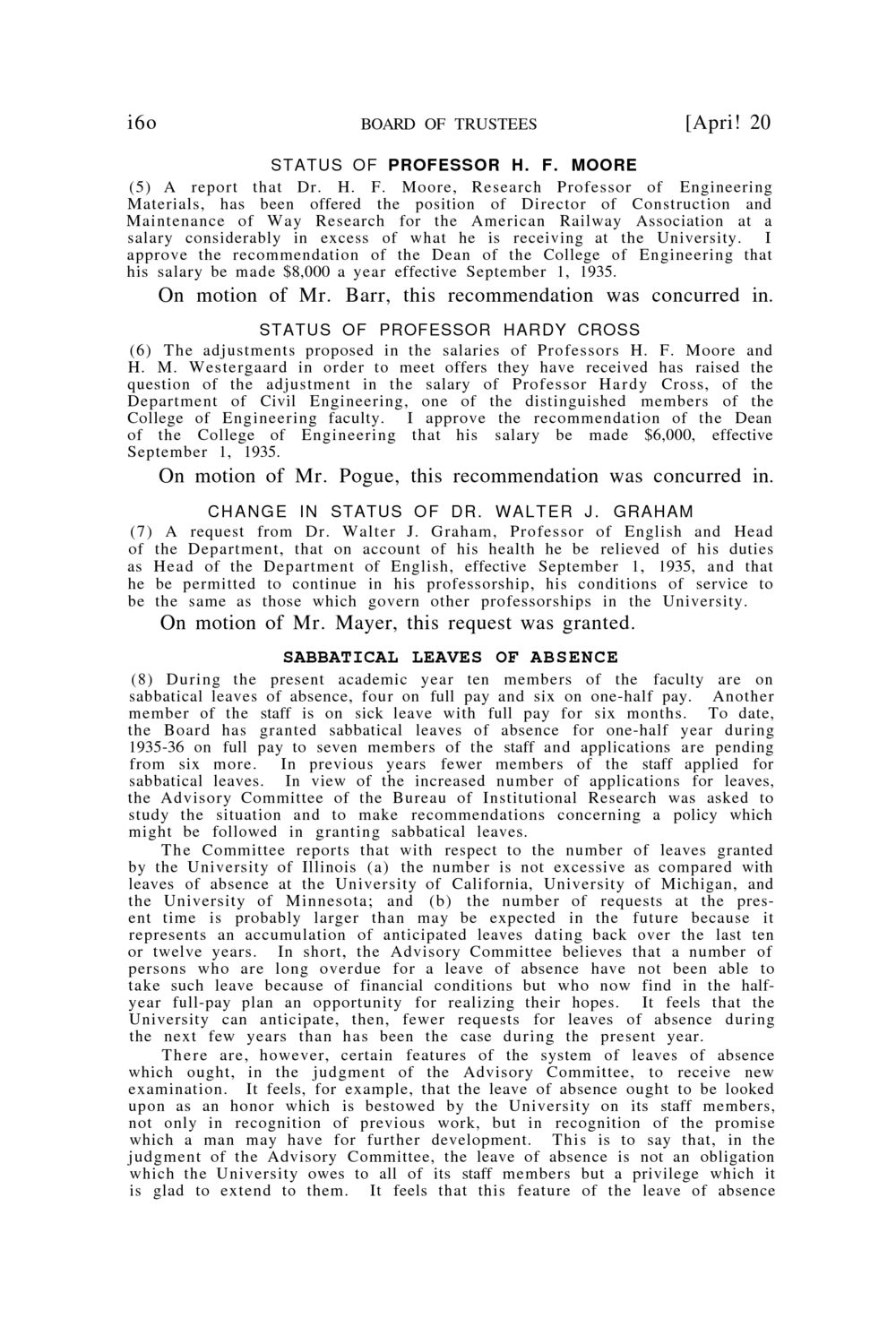| |
| |
Caption: Board of Trustees Minutes - 1936
This is a reduced-resolution page image for fast online browsing.

EXTRACTED TEXT FROM PAGE:
i6o BOARD OF TRUSTEES [Apri! 20 STATUS OF PROFESSOR H. F. MOORE (5) A report that Dr. H. F. Moore, Research Professor of Engineering Materials, has been offered the position of Director of Construction and Maintenance of W a y Research for the American Railway Association at a salary considerably in excess of what he is receiving at the University. I approve the recommendation of the Dean of the College of Engineering that his salary be made $8,000 a year effective September 1, 1935. On motion of Mr. Barr, this recommendation was concurred in. STATUS OF PROFESSOR HARDY CROSS (6) T h e adjustments proposed in the salaries of Professors H. F. Moore and H. M. Westergaard in order to meet offers they have received has raised the question of the adjustment in the salary of Professor H a r d y Cross, of the Department of Civil Engineering, one of the distinguished members of the College of Engineering faculty. I approve the recommendation of the Dean of the College of Engineering that his salary be made $6,000, effective September 1, 1935. On motion of Mr. Pogue, this recommendation was concurred in. C H A N G E I N STATUS O F DR. W A L T E R J . GRAHAM (7) A request from Dr. Walter J. Graham, Professor of English and Head of the Department, that on account of his health he be relieved of his duties as H e a d of the Department of English, effective September 1, 1935, and that he be permitted to continue in his professorship, his conditions of service to be the same as those which govern other professorships in the University. On motion of Mr. Mayer, this request was granted. SABBATICAL LEAVES OF ABSENCE (8) During the present academic year ten members of the faculty are on sabbatical leaves of absence, four on full pay and six on one-half pay. Another member of the staff is on sick leave with full pay for six months. To date, the Board has granted sabbatical leaves of absence for one-half year during 1935-36 on full pay to seven members of the staff and applications are pending from six more. In previous years fewer members of the staff applied for sabbatical leaves. In view of the increased number of applications for leaves, the Advisory Committee of the Bureau of Institutional Research was asked to study the situation and to make recommendations concerning a policy which might be followed in granting sabbatical leaves. T h e Committee reports that with respect to the number of leaves granted by the University of Illinois (a) the number is not excessive as compared with leaves of absence at the University of California, University of Michigan, and the University of Minnesota; and (b) the number of requests at the present time is probably larger than may be expected in the future because it represents an accumulation of anticipated leaves dating back over the last ten or twelve years. In short, the Advisory Committee believes that a number of persons who are long overdue for a leave of absence have not been able to take such leave because of financial conditions but who now find in the halfyear full-pay plan an opportunity for realizing their hopes. It feels that the University can anticipate, then, fewer requests for leaves of absence during the next few years than has been the case during the present year. T h e r e are, however, certain features of the system of leaves of absence which ought, in the judgment of the Advisory Committee, to receive new examination. It feels, for example, that the leave of absence ought to be looked upon as an honor which is bestowed by the University on its staff members, not only in recognition of previous work, but in recognition of the promise which a man may have for further development. This is to say that, in the judgment of the Advisory Committee, the leave of absence is not an obligation which the University owes to all of its staff members but a privilege which it is glad to extend to them. It feels that this feature of the leave of absence
| |